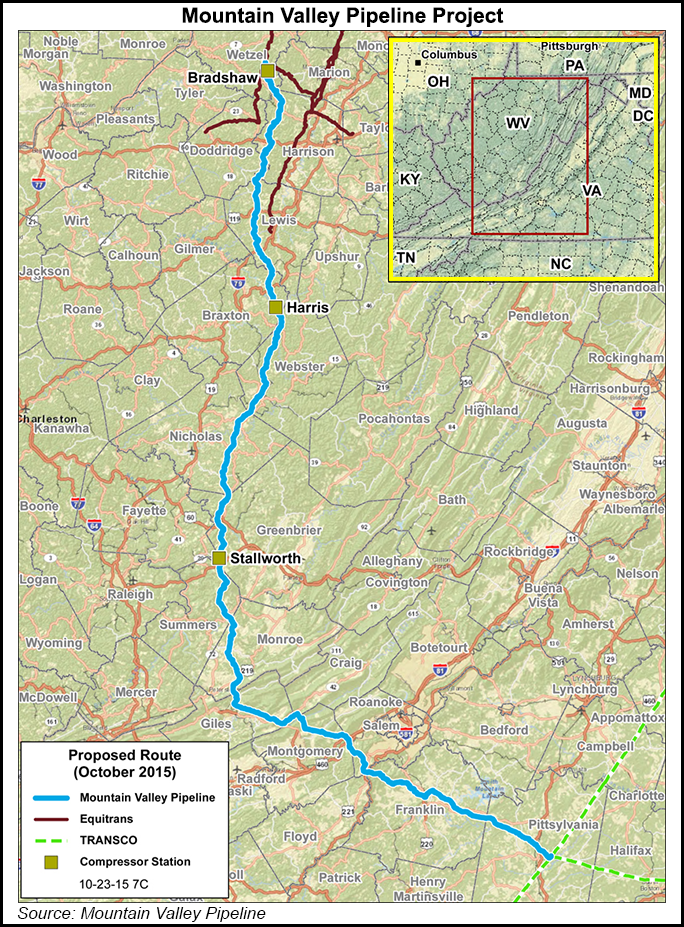Regulatory | Infrastructure | NGI All News Access | NGI The Weekly Gas Market Report
MVP Still Guiding for Service by Late 2019 after Court’s Key Water-Crossing Opinion
A highly anticipated opinion issued late Tuesday substantiating the U.S. Court of Appeals for the Fourth Circuit’s decision last month to vacate the Mountain Valley Pipeline (MVP) Nationwide Permit (NWP) 12 isn’t expected to have an impact on the project’s latest timeline, a spokesperson said.

However, the court outlined other issues with federal and state regulators handling of authorizations for the project, mainly the West Virginia Department of Environmental Protection’s (WVDEP) decision to waive the requirement for a water quality certification (WQC). WVDEP instead imposed special conditions on the NWP 12, which is issued by the U.S. Army Corps of Engineers, allowing contractors to trench through streams and rivers under Section 404 of the Clean Water Act (CWA).
The Sierra Club and other environmental groups seized on a special condition WVDEP included in the NWP 12, requiring all water crossings in the state to be constructed within 72 hours. MVP had planned to use the more environmentally protective but time-consuming “dry cut” crossing method in what the Sierra Club argued was in violation of the 72-hour special condition.
The Army Corps verified that the project met the criteria of NWP 12 and recognized that the dry-cut crossing method would take up to six weeks to complete, regardless of the special condition. In vacating the NWP 12 in October, the court concluded that the Army Corps “lacked authority” to substitute the ”dry cut’ requirement for West Virginia’s 72-hour restriction.
At the time it vacated the permit, the Fourth Circuit indicated a more detailed opinion was forthcoming. The court said in its opinion on Tuesday that the state’s move to waive the WQC, which is also required under Section 401 of the CWA, was invalid because West Virginia regulators failed to provide notice to the public and an opportunity to comment as required by federal law. Furthermore, the court found that the Army Corps failed to explain why that waiver was accepted as valid when it verified that the project met the criteria of the NWP 12.
Analysts at Height Securities LLC said the WVDEP must continue modifying the special condition language included in the NWP 12 and address the WQC issue, a step they expect to be finished by year’s end, so MVP can reapply for a new permit. If all agencies move quickly, Height’s analysts expect the NWP 12 to be reinstated by mid-2019, keeping the project on track to enter service by the end of next year.
After the court vacated the NWP 12, the Army Corps late last month suspended authorizations for all water crossing work along MVP’s entire 300-mile route. MVP said at the time that it expects a new NWP 12 to be issued by early next year.
That outlook did not change with the Fourth Circuit’s opinion on Tuesday, MVP spokesperson Natalie Cox said.
“Since receiving the court’s ruling in October, the MVP project team has been, and will continue, working with the state of West Virginia and the Army Corps to comply with the court’s decision,” she said. “With ongoing evaluation of its construction plan,” Cox added, MVP is still targeting full service by 4Q2019.
WVDEP spokesman Jacob Glance added that the agency is “completing our responses to comments, finalizing the modifications” to the special condition language “and preparing to send them” to the Army Corps and the U.S. Environmental Protection Agency for review.
Plagued by ongoing legal challenges, permit issues, work stoppages and inclement weather, MVP has already raised its cost estimate for the project by about $1 billion to $4.6 billion. The project has also pushed back its in-service date twice in recent months, once from 4Q2018 to 1Q2019, and then again to 4Q2019.
MVP would move 2 Bcf/d of Appalachian gas to markets in the Southeast and Mid-Atlantic via an interconnect with the Transcontinental Gas Pipe Line in southwestern Virginia.
© 2024 Natural Gas Intelligence. All rights reserved.
ISSN © 1532-1231 | ISSN © 2577-9877 | ISSN © 1532-1266 |
